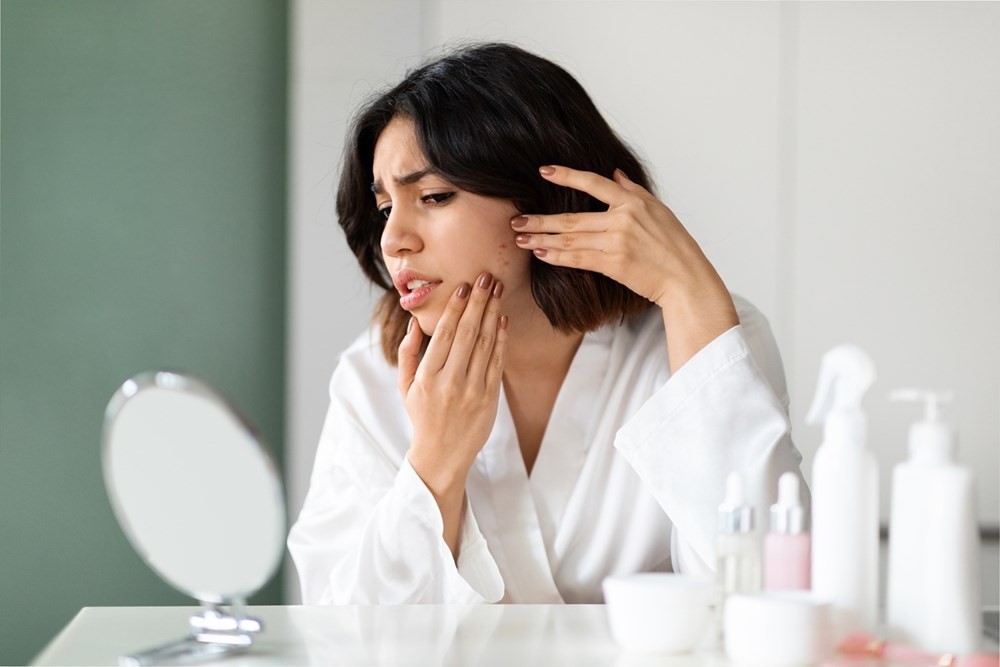If acne is one of your biggest beauty concerns, chances are you’ve tried everything—from home remedies to conventional treatments—and probably spent a lot on oil-free, non-comedogenic skincare products. But today, the solution might be simpler than ever. Hyaluronic acid, a naturally occurring substance in your skin, is proving to be a direct and effective approach to acne care.
اضافة اعلان

What Is Hyaluronic Acid?
Hyaluronic acid (HA) is a naturally occurring substance found in your skin, connective tissues, and joints. Its main job? Keeping your skin hydrated. HA binds to water molecules and can retain up to 1000 times its weight in water, making it a go-to ingredient in serums, creams, and moisturizers.
As you age, the natural levels of HA in your skin decrease, leading to dryness and loss of elasticity. For acne-prone skin, dryness and a compromised skin barrier are common problems—especially because many acne treatments (like benzoyl peroxide, salicylic acid, and retinoids) strip the skin of moisture and oils, often leaving it irritated and overly dry.
When this happens, your skin can overcompensate by producing more oil (sebum), leading to clogged pores and more breakouts—a frustrating cycle.
Here’s How Hyaluronic Acid Can Help:
1. Provides Deep Hydration
HA delivers essential hydration without clogging pores. Unlike thick moisturizers that can trap oil and dirt, HA is lightweight—it attracts and retains moisture without leaving a greasy film.

It also helps regulate your skin’s oil production and maintains a healthy balance—both of which are crucial in preventing breakouts. According to a 2017 study published in the Journal of Investigative Dermatology, proper hydration can help reduce excess sebum and acne formation.
2. Soothes Redness and Irritation
For many people with acne, redness and irritation are just as troubling as the breakouts themselves. HA has anti-inflammatory and wound-healing properties that calm the skin and promote a more stable, less reactive environment, as noted in a 2021 study published in Biomolecules.
3. Boosts Absorption of Other Ingredients
Properly hydrated skin absorbs active ingredients—like retinoids or salicylic acid—more effectively. When used alongside HA, these treatments are less likely to dry out or irritate the skin, allowing for more targeted and efficient results.
4. Helps Heal Acne Scars
HA can also help improve the appearance of acne scars. A 2018 study in Dermatologic Surgery found that HA fillers were effective and safe for treating atrophic acne scars. Hydrated skin heals faster, which means incorporating HA into your routine can help scars fade sooner.
Does Hyaluronic Acid Cause Acne?
While HA does not cause acne, certain formulations that mix HA with heavy oils or comedogenic agents can trap dirt and bacteria, leading to breakouts. Also, applying HA on dry skin without sealing it with a moisturizer can sometimes draw moisture from deeper layers, causing dryness and increasing oil production—potentially worsening acne for some people.
How to Use Hyaluronic Acid for Acne-Prone Skin
To get the most out of HA, use it correctly:
Apply on Damp Skin:
HA draws in moisture, so always apply it to damp (not dry) skin to avoid dehydration. After cleansing, gently pat your face so it remains slightly moist.
Use a Serum First:
Apply a few drops of an HA-based serum to your damp face.
Lock in Moisture:
Follow up with a non-comedogenic lightweight moisturizer to trap the hydration inside your skin.
Pair with Acne Treatments Carefully:
You can use HA before or after acne treatments like benzoyl peroxide or retinoids. If your routine includes multiple actives, apply HA first to create a calming moisture base and reduce irritation. If your skin feels too dry, layer HA on top of your acne treatments to form a protective barrier.
Show Related News
Show Related News



